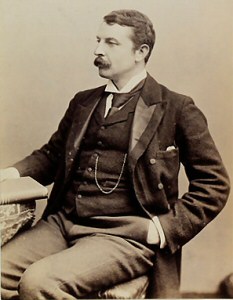Frank Evers Beddard facts for kids
Quick facts for kids
Frank Evers Beddard
FRS FRSE
|
|
|---|---|
 |
|
| Born | 19 June 1858 Dudley, England
|
| Died | 14 July 1925 (aged 67) West Hampstead, England
|
| Alma mater | New College, Oxford |
| Known for | Annelids Animal coloration |
| Awards | Linnean Medal (1916) |
| Scientific career | |
| Fields | Annelid Zoology |
| Institutions | Zoological Society of London |
| Author abbrev. (zoology) | F.E.B. |
Frank Evers Beddard was an English zoologist. A zoologist is a scientist who studies animals. He was born on June 19, 1858, and passed away on July 14, 1925.
Beddard became a top expert on annelids. Annelids are a group of worms that includes earthworms and leeches. He was so good at his work that he won the Linnean Medal in 1916. This award was for his important book about a type of annelid called oligochaetes.
Contents
Frank Beddard's Early Life and Education
Frank Evers Beddard was born in a town called Dudley, Worcestershire, in England. His father was John Beddard.
He went to school at Harrow School, which is a famous school. After that, he studied at New College, Oxford, a well-known university. He later passed away in West Hampstead, London.
Frank Beddard's Career in Zoology
From 1882 to 1884, Beddard worked for the Challenger Expedition Commission. This was a big science trip that explored the oceans.
In 1884, he got an important job at the Zoological Society of London. He became the prosector. This meant he was in charge of carefully preparing animals that had died for study. He took over this role after another scientist, William Alexander Forbes, passed away.
Beddard also taught at several places. He was a biology lecturer at Guy's Hospital. He also taught zoology and comparative anatomy at the University of London. Later, he taught about animal forms, or morphology, at Oxford University.
Beddard's Work on Annelids and Other Animals
Frank Beddard wrote many books and articles about different animals. He studied many topics in zoology. These included small crustaceans called Isopoda, large animals like Mammalia, and even birds (ornithology). He also studied how animals are spread across the world (zoogeography) and why animals have different colors (animal coloration).
He was especially known for his deep knowledge of annelids. He wrote two books about these worms. He also wrote articles about earthworms, leeches, and another type of worm called Nematoda for the 1911 Encyclopædia Britannica.
A famous writer named W.H. Hudson once said that Beddard was the "greatest authority in the universe" on earthworms. This shows how respected he was in his field.
Beddard also wrote biographies about other zoologists. These included William Henry Flower and John Anderson. He also wrote a whole book about mammals for the Cambridge Natural History series.
Frank Beddard's Legacy
A type of mammal called Beddard's olingo is named after him. This animal was named by a scientist named Reginald Innes Pocock in 1921.
Frank Beddard's Major Works
Books Written by Frank Beddard
- Report on the Isopoda collected by H. M. S. Challenger during the years 1873–76 (1884)
- Animal Coloration: an account of the principal facts and theories relating to the colours and markings of animals (1892)
- A Text-book of Zoogeography (1895)
- A Monograph of the Order of Oligochaeta (1895)
- A Book of Whales (1895)
- The Cambridge natural history. Vol 10 Mammalia (1895)
- Elementary Zoology (1898)
- The Structure and Classification of Birds (1898)
- Mammalia (1902)
- Natural History in Zoological Gardens: Being Some Account of Vertebrated Animals (1905)
- Earthworms and Their Allies (1912)
Chapters in Other Books
- Hudson, W.H. and Beddard, Frank E. British Birds. Chapter on structure and classification. First edition 1898. Longmans, Green, 1921.
Images for kids
 | Janet Taylor Pickett |
 | Synthia Saint James |
 | Howardena Pindell |
 | Faith Ringgold |


